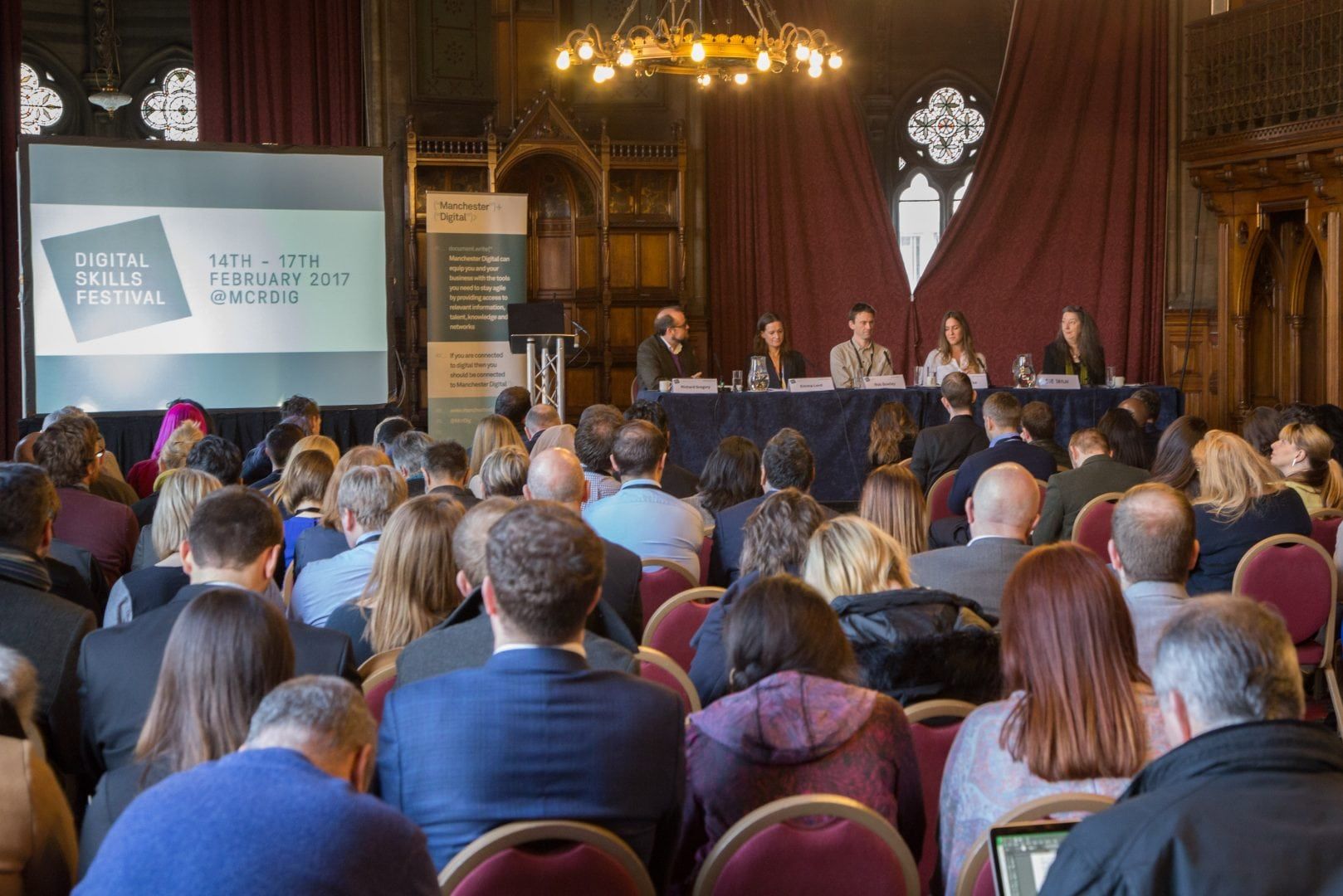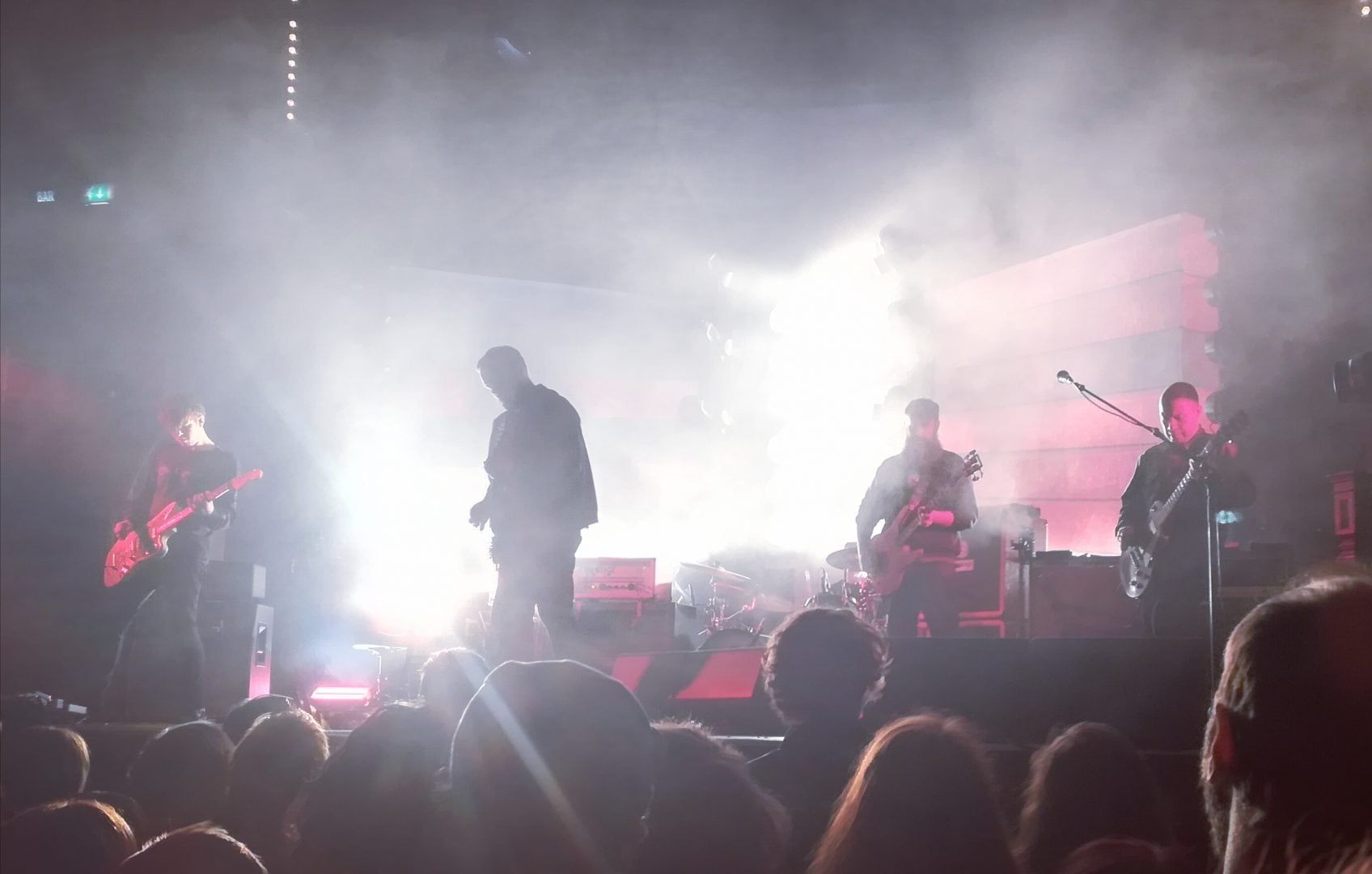Marina Jenkins visited the team behind the new play Flushed and interviewed writer and director Kate Cranfield, assistant director Toni Ward and the two actresses Georgia Phillips and Harri Millsopp.
Marina Jenkins (MJ): Thank you all for allowing me into your rehearsal room today. First of all, Kate, tell me what Flushed is about and what inspired you to write it.
Kate Cranfield (KC): Flushed is my second full-length play that I’ve written.
When I write, I always try to create strong female characters because there is still a lack of these represented onstage. I also wanted to have a go at writing a two-hander because I saw it as a new challenge.
One day an idea just came to me, that I wanted to set a play in a girls bathroom and that it would be about two best friends. This quickly turned into two sisters as I’ve always had an interest in the dynamics between siblings.
I’ve got a brother but not a sister, so I wanted to look at that relationship in more detail. I started writing the script but quickly realised that it wasn’t really about anything in particular so I left it alone for a couple of months.
I then read an article about fertility issues with women and premature menopause. This was the only thing talked about in the article that I hadn’t heard of, so I went online and did a bit of research about it and found hardly anything.
So I thought, what would happen if I worked this into the play? And the second I did it, everything kind of slotted together. It’s something that needs to be spoken about and doing a play of this nature is an interesting way of showing it to a new audience.
MJ: That nicely leads me onto my next question, why did you pick premature menopause to be the focus of your writing?
KC: I think it’s because premature menopause simply isn’t spoken about. I did a lot of research and there is not another play out there that discusses this issue.
Normally when you write a play, you can find overlaps in other people’s work but there seemed to be a gap with this. There’s a lot out there at the moment about women’s rights, sexuality, women in the workplace and the female body but this is something slightly more niche that hasn’t been given a voice yet.
This topic is just as important and affects so many people in so many ways but isn’t being covered, even fertility in women and motherhood has been covered.
This is why we’re doing Flushed, because we truly feel that it’s vital and we don’t want to keep it left out.
MJ: So you tested out the play in August 2017 at the Blue Fairy Festival in Norfolk, how did this event come about and what was the reception like?
KC: A girl I went to school with very sadly passed away and her older sister organised this arts festival in her memory because she was someone who loved poetry, art, drama and music.
We were invited to perform at the event after our friend Phoebe had a conversation with her sister. I had written the play at this point, although now it has changed quite a lot.
It was a very early draft, kind of script-in-hand type thing and we had a full read-through. Even though it was an arts festival, no-one seemed to actually want to sit down and watch to a play in silence.
We were really nervous and didn’t know quite what to expect from the audience. We just started performing and by the end of the play every single person in the tent had turned around and was engaged with the piece. It was the best outcome we could’ve hoped for!
MJ: How have you found assistant directing the play Toni and how did this come about for you?
Toni Ward (TW): Kate sent me the play and I immediately found it funny and liked how it was so simple with two women onstage telling this story.
I knew that any person watching the play would be able to relate to it, we’ve all been in toilets in clubs and had those funny conversations.
I kept reading the drafts and after Kate and I moved in together, she just asked if I wanted to assistant director. I instantly said I’d love to and we kind of went from there.
KC: When I wrote it, I had such a strong vision for the play. I don’t always think that writing and directing is the best combination because it can be difficult to see past your own ideas.
But because I had such a strong connection to the script, I realised that it just wouldn’t be right for me not to direct it. By the same token, I didn’t want to be too close to it and because I trust Toni so much, I thought it would be a good idea to ask if she was interested in assistant directing to keep me balanced and to have different creative ideas in the mix.
TW: Today has been so nice because it’s the first full rehearsal I’ve been able to sit in on. It’s so rewarding seeing the play come to life and all the changes that have been made since the start of the process.
MJ: Sometimes the roles of the director and the assistant director can become blurred. How have the two of you separated your roles and made this work for you?
TW: Well for example, today we split up the warm-up exercises, Kate did the meditation and then we did a full run through. We both gave separate notes at the end and took it in turns to give feedback.
We have a similar work ethic, it’s there’s never a case where we clash over the same point. There’s no tension and I think we gel creatively which is a good thing!
MJ: This is your first project completely separate from the safety net of being a university student with support from the drama department and the drama society. How have you found the experience so far?
TW: I think the Fringe process really helped Kate work out how to do projects independently. She seems to know exactly what needs to be done and what to prioritise.
KC: I agree and I think uni set us up really nicely and helped us navigate how to put on theatre independently and use what Manchester has to offer.
Georgia Phillips (GP): Well as you were saying, whilst we don’t have that safety net of the drama department and the guarantee that all your friends will come to watch the shows, it is a risk putting on something like this.
However, the risk makes it so much more exciting and more of a challenge. We don’t know who’s going to turn up and how it’s going to go and what kind of response it will get. So we have to make it as good as we can. I think we have all enjoyed the challenge so far.
MJ: What would you say is your favourite bit to perform from the play?
Harri Millsopp (HM): Well this is a tricky one because I love all the scenes. We haven’t finished blocking the play yet so my answer to this question might change. The opening scene, for me, is so enjoyable to act.
It’s quick, it’s witty and encapsulates their relationship. It’s kind of like table tennis, well the majority of the scenes are like that, so that’s quite challenging in a way because, in theatre, duologues don’t usually last for an entire play.
We can’t rely on other people and the play is mostly talking over one another at a fast pace.
GP: We just finished blocking a scene today which is the turning point in the narrative. It starts as this funny story and then this particular scene comes around and begins to show the cracks in their relationship and how it’s all going to unravel.
I like that, I like the scene where everything starts to go downhill. Because we’ve basically been doing comedy up until now –
HM: and we haven’t really done a scene where there’s been a serious, emotional conversation. There’s not been a situation yet where difficulty or conflict has arisen.
GP: The conflict on really arises halfway through the plot and we’ve got a lot left to block so I’m excited to see how it plays out. I think we’ve really built up the chemistry between the sisters so I’m excited to explore how the conflict manifests itself.
MJ: Leading on from that, because the play is about a relationship between sisters, how did you build the chemistry between each another?
HM: I honestly feel like it came so naturally to us. I’ve never been in a play where I felt so connected to the character or actor. It’s very bizarre how it’s just happened.
GP: With a two-hander, you do feel this added pressure because this relationship is what the entire play bounces off so if it doesn’t work then the play won’t have much life to it. We did do quite a few character exercises at the start of rehearsals, but we didn’t have to do too much.
HM: It sounds very cliché but when I met you, I did feel like I remembered you in a previous life. In a sense, I do feel very lucky that we haven’t had to work on our chemistry a ridiculous amount.
MJ: What do you anticipate might be your biggest challenge when acting these roles?
GP: Portraying the situation truthfully is the main thing. We have been working with the Daisy Network which is a charity to support women with premature menopause and we are in conversation with a few women who have suffered from the condition.
KC: It is the most amazing charity, it’s quite small but the work they do is amazing. They’re the only charity in the UK that addresses this issue which is unbelievable. They gave me a list of women who were interested in sharing their story and we’ve been in conversation with three or four for a while now.
We went for coffee with one of the women on Friday and she was so open and honest in sharing her story, we really felt like we could ask any question.
GP: It was good to find out how the condition had affected other people around her because it’s easy enough to read up online about the symptoms but how it truly affects you as a person, your friendships and your relationships is a different thing altogether. The biggest challenge for me will definitely be wanting to portray it truthfully and do it justice.
KC: The woman we spoke to read the script as well and she really liked it and we are really excited that three of them are coming to see the play in March.
MJ: How did your partnership with 53two come about?
KC: We are performing the play at 53two for the run in March and so far, they have been absolutely amazing. Initially, we didn’t get anywhere with the venue as they said they were completely booked up.
But we tried again a few weeks later and eventually myself and Elis, our producer, met up with a guy called Simon. At this point, he had read the script and really loved it.
He seemed to get the piece and ended up offering to co-produce the play with us as he wants to make sure that this unrepresented topic gets a stage. So far the partnership has worked so well.
Not only can we use their space, we’ve been able to use Hope Studios, they’re always a phone call away and had great ideas for nights we can do to promote the play.
MJ: After Manchester, are you planning on taking Flushed down to London?
KC: Well hopefully, we have sent the script to a bunch of venues and just waiting to hear back. The plan is London, Edinburgh, New York and the Moon!
MJ: How are you going about promoting the play and how will you ensure that it gets the recognition it deserves?
KC: We are inviting reviewers, other theatres, theatre companies, the Daisy Network and hopefully will get it filmed so we can send it out.
TN: We just want to make it as big as it can be. It’s such an important issue and the theatre is the best place to educate people anyway. I’m particularly anticipating seeing the reactions of male audience members, to see how the play might affect them.
GP: I agree, that is what’s so great about the play. The first half is so funny and sweet and you grow to love Marnie and Jen. Even men who might be more uncomfortable talking about menopause, I definitely think that Flushed has the capacity to really touch them.
HM: I think as well that at the moment there are so many plays about depression in particular and this brings a different angle to the debate. I really think it could take off.
TN: And not that it could take off but should take off because the play will actually help people learn about this health condition, especially because hardly anybody has heard about it.
KC: Most people have the feeling of isolation in common. The women we talked to all said that they didn’t know where to turn to because there are no obvious groups out there other than the Daisy Network.
The support and response we’ve had already has made us feel so incredibly lucky, and to have 53two behind us as well as the Manchester Actors Platform. So much has gone into Flushed already and we just want to keep meeting people.
TN: If you want to talk to us then come to talk to us, we’d love to hear about your experiences and share what we have learnt from this process so far.
KC: That is what essentially drives us into wanting to make this play and take it as far as it can possibly go.
Flushed runs at 53two from 27th-31st March. You can follow the play on Facebook, Instagram, and Twitter.




























